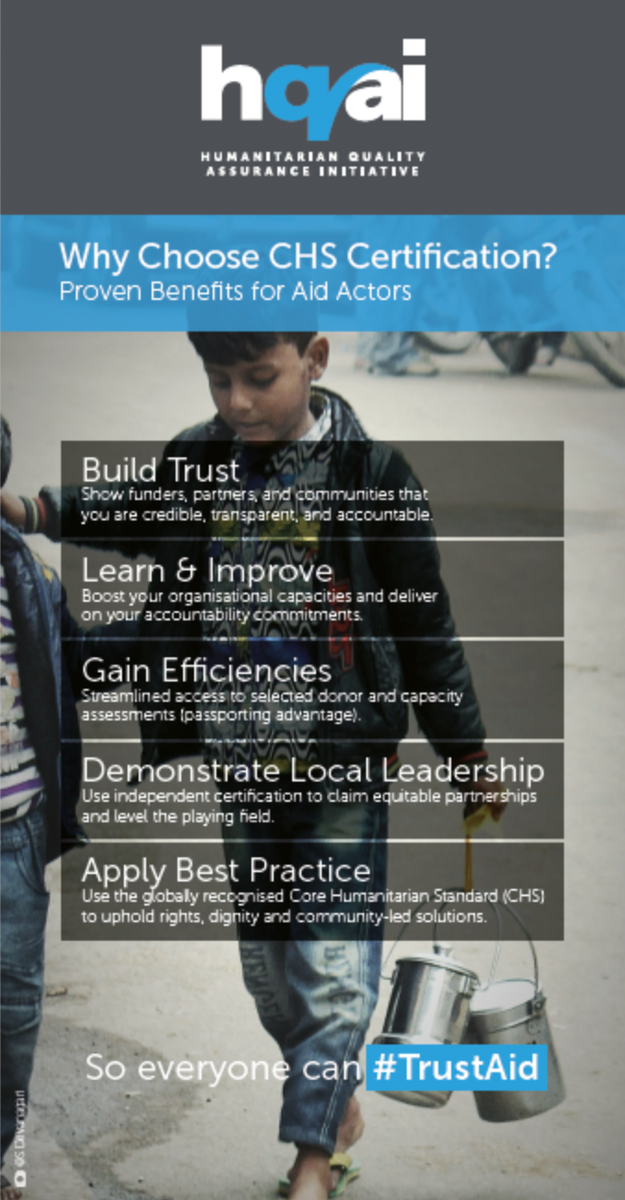Quality locally-led aid
Supporting Locally-Led Aid Through Quality Assurance
Leveling the Playing Field: How HQAI CHS Audits Strengthen Locally-Led Aid
The role of national and local organisations (LNAs) in responding to vulnerable people in situations of crises is widely recognised. A central challenge to moving the localisation agenda forward is effectively managing the tension between funders’ need for compliance/risk management and their commitment to locally-led response.
HQAI provides a concrete and tested solution to to bridge this gap by providing external recognition of capacity for LNAs:
- Independent audits provide LNAs with an objective assessment of their strengths and areas for improvement against a quality standard;
- Management system audits contribute to sustainable system-strengthening within aid actors;
- Internationally recognised HQAI CHS audits can be used to reduce power imbalances in funding and partnership discussions with back donors and intermediaries.
The diversity of agencies (size, mandate, location, ways of working) demonstrates the adaptability of the CHS and of HQAI’s audit approaches.

Accessibility
- LNAs benefit from cost reductions of up to 20% for an audit cycle since January 2025.
- HQAI collaborates with governments, intermediaries and LNAs on the collective development of sustainable financing models for LNAs to access quality assurance services.
- Almost 40% of HQAI audited partners are LNAs, some of which use their own funds for the audit.
- The HQAI Facilitation Fund continues to be one instrument to facilitate LNAs’ audits with HQAI, as well as individuals’ access to auditor trainings.
Capacities and local engagement
- HQAI is developing a network of local auditors and audit facilitators in strategic focus regions. This is increasing audit capacity closer to audit sites to harness local talent and reduce audit costs.
- By auditing cohorts of LNAs (networks or consortia operational in the same region) organisations join forces in implementing the CHS, learning and improving together and bring economies of scale to being independently assessed.
- LNAs continually highlight how audits have led to strengthening their management systems and capacities, self-confidence and trust with stakeholders.
Showing that we are working hard to meet this global CHS mark continually increases the credibility and trust we get from donors, partners and, most importantly – the people we serve.
Abdullah Al Kaff, Partnership Officer at Building Foundation for Development in Yemen.
Go deeper: case studies
What: Testing a quality assurance system from which to reduce compliance burdens, streamline due diligence processes, enhance LNAs capacities and increase access to funding.
Key learnings to date:
- High demand from LNAs to participate in the project.
- Sahel Regional Fund (SRF) and 5 INGO funders participate in developing passporting pathways based on the CHS audits and intermediaries' Due Diligence.
- SRF are using CHS audit reports as reference for capacity-strengthening plans and investments.
What: raise awareness of CHS verification options and explore new financial models to support lNAs with audit costs. DRA are committed to support up to 4 national partners undertake Certification Audits by end of 2026.
Key learnings to date:
- Growing interest in quality assurance services to drive accountability, demonstrate capacity, and build trust in difficult operational contexts.
- Existing HQAI partners based in Yemen testify to benefits of CHS audits in strengthening their management systems and support to improve CHS results over time.
- Access to communities has been challenging for HQAI auditors – we now have trained yemeni auditors and audit facilitators
What: Diakonie Katastrophenhilfe co-funded the HQAI CHS audits of four of its implementing partners in Colombia.
Key learnings to date:
- New cost-sharing models improve LNA access to audits.
- Identificaton of efficiencies through carrying out audits of a group of organisations at the same time.
- Emergence of a CHS verification community of practice – peer to peer support amongst group of organisations undergoing audits at the same time.
- HQAI audit methodology can be effectively applied to small local organisations (e.g. <USD400K annual budget).
Hear from our local and national partners
Category